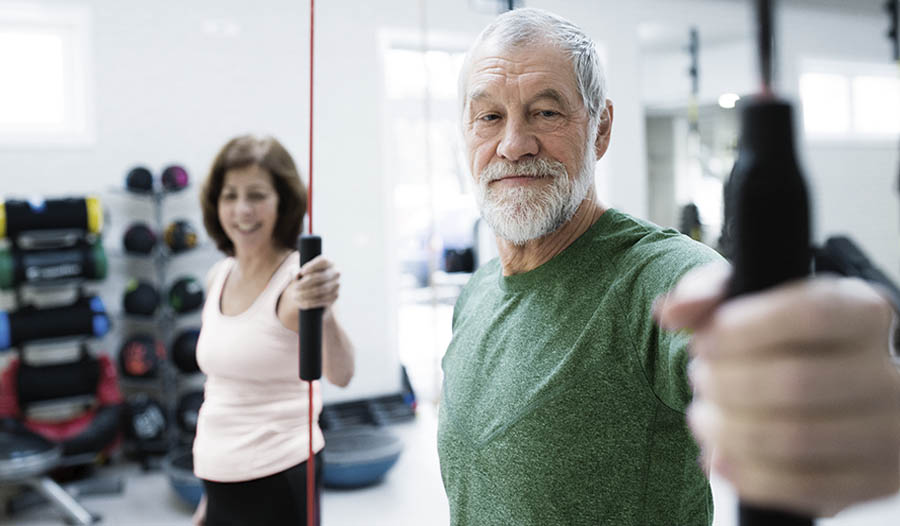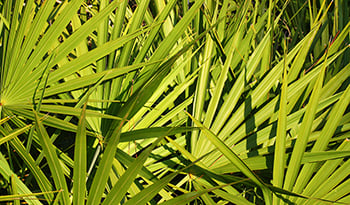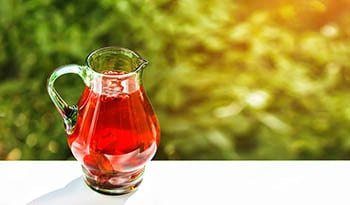Natural Solutions for Men’s Health Support
DISCLAIMER:This blog does not intend to provide diagnosis...
- In this article:
- What is Andropause?
- Symptoms of Low T in Aging Men
- What Causes Low T?
- Boosting Testosterone
- Aging and Lifestyle

Do men experience a similar physiological event to what women experience during menopause? Often referred to as “andropause, “male menopause,” or "man-opause," this even does have some superficial similarities to menopause. But, while all women go through menopause, not all men go through andropause.
What is Andropause?
Andropause reflects the appearance of signs and symptoms related to the slow, but steady reduction in the hormones testosterone and dehydroepiandrosterone in middle-aged men. Decreased testosterone naturally occurs as men age, but in andropause or its more technically correct term of “hypogonadism” levels drop below the normal range for a given age.
In case you have not seen the ads for “Low T” on TV or in press, there is a big push by suppliers of prescription testosterone preparations to get men hooked on the quick fix of testosterone therapy. Suffice it to say, that this whole area of andropause and Low T is fraught with controversy.
Symptoms of Low T in Aging Men
Do low levels of testosterone produce symptoms in middle-aged men? Absolutely. In fact, the classic symptoms have been recognized for over 70 years ago when two American physicians, Carl Heller, M.D., and Gordon Myers, M.D., showed the effectiveness of testosterone treatment for symptoms of fatigue, depression, irritability, reduced libido, erectile dysfunction, night sweats, and hot flashes.
Subsequent studies over the years have definitely found that some, but not all men, with low age-adjusted testosterone levels show these sorts of symptoms as well as improvement with testosterone therapy.
What Causes Low T?
Testosterone levels naturally decline 10% every decade after age 30 or roughly 1% per year. That is normal, what is not normal is when testosterone levels drop faster than this rate. There are a number of factors that can lead to low testosterone including:
- Obesity, diabetes, and insulin resistance are the main causes of low testosterone today. The level of total and free testosterone is reduced in obese men in proportion to the level of obesity. Making matters worse is that estrogen is increased.
- Chronic inflammation is another risk factor for low testosterone. Insulin resistance is the key factor in causing silent inflammation and high levels of high-sensitivity C-reactive protein (hsCRP).
- Increased exposure to “xenoestrogens” – compounds in food and the environment that exert estrogenic effects including pesticides; phthalates (plastics); tobacco smoke byproducts; heavy metals (lead, mercury, etc.), and various solvents. Xenoestrogens enhance the effects of estrogen in men leading to lower production of testosterone.
- Lack of physical activity. On the flip side, one of the quickest ways to boost testosterone production is regular bouts of short intense exercise, especially weightlifting.
- Stress has a negative effect on testosterone levels by increasing the release of the adrenal hormone cortisol.
Boosting Testosterone
The best approach to boosting testosterone levels in men with low T is addressing underlying issues by improving the action of insulin, achieving ideal body weight, and improving blood sugar control. Weight loss alone has been shown to increase testosterone levels by 50%. Beyond these basic measures there are a number of natural products that may be helpful:
- Zinc is perhaps the most critical trace mineral for male sexual function and is found in high concentrations within the prostate, testes and particularly high amounts are also found in the semen (approximately 2.5 mg of zinc is lost per ejaculate). It is involved in virtually every aspect of male reproduction, including testosterone metabolism. Several studies support the use of zinc supplementation in the treatment of low sperm counts, especially in the presence of low testosterone levels. In these studies, zinc has shown an ability to raise both sperm counts and testosterone levels. Many men may be suffering from low T simply because they are lacking sufficient zinc. Daily supplementation of 30 to 45 mg per day is recommended to insure adequate zinc levels.
- Fenugreek contains a number of active plant steroids, most notably fenuside and protodioscin. Fenugreek extracts have shown promising results in improving libido and testosterone levels in several human clinical studies. In one double-blind study, the group taking 600 mg of special fenugreek extract daily reported improved libido (81.5%), recovery time (66.7%), and quality of sexual performance (63%) as well as a mild effect in boosting testosterone levels. In another study, 50 male subjects between the age of 35 to 65 years took 500 mg per day of a 20% protodioscin content fenugreek extract. Free testosterone levels were improved in 90% of the study population as much as 46%.
- Eurycoma Longifolia (tongkat ali or longjack) is a flowering plant native to Indonesia, Malaysia that is heavily promoted as a testosterone booster and sexual performance enhancer. There is some evidence to support these claims along with concerns over fake products on the market. In one study in men with Low T, a daily dosage of 200 mg of a standardized water-soluble extract of longjack produced a 46% increase in total testosterone levels with 90% of the subjects achieving testosterone levels within the reference range for their age. In another study, thirteen physically active males (ages 57–72 years) given 400 mg of longjack extract daily for 5 weeks demonstrated a 15% increase in serum testosterone and a 61% increase in free testosterone levels. Positive results have also been noted for improving sperm counts and sexual well-being.
- Tribulus terrestris (Tribulus) has been used traditionally in Ayurvedic medicine as a tonic and aphrodisiac and in European folk medicine to increase sexual potency. While studies in healthy males with normal testosterone levels have not shown Tribulus to raise testosterone levels, there is some clinical evidence that it may be effective in raising testosterone levels in men with low T. A 2012 study showed that consuming six grams of tribulus root for 60 days raised testosterone levels by 16% and improved erections and frequency of sex in men with low sperm counts. Typical dosage for tribulus extracts are 100 to 250 mg per day.
- Chrysin is a flavonoid that has been shown to be an inhibitor of the aromatase enzyme that converts testosterone to estrogen. Chrysin is available as a dietary supplement, but it has a low bioavailability. Natural sources like royal jelly and propolis may contain other factors that improve absorption. I really like royal jelly for low T even though there is no clinical investigations in this application. Royal jelly is produced by nurse bees that mix honey and bee pollen with enzymes in the glands of their throats to produce a thick, milky substance that they then feed to the queen bee. Royal jelly is a concentrated food as evident by the queen bee's superior size, astounding ovulation, stamina, and longevity. The scientific investigation into the health promoting properties of royal jelly has focused on its ability to lower blood cholesterol levels, but I think it exerts far greater benefits. The typical dosage is 50 mg to 100 mg per day.
- Maca is becoming increasingly popular. Maca is the common name for Lepidium meyenii, a plant in the broccoli family that is grown exclusively in Peru. It looks a lot like a turnip. One of maca’s most renowned benefits is the enhancement of sexual desire and function for both men and women. Clinical trials confirm these properties, including maca’s benefits in erectile function. Maca does not appear to directly affect the level of testosterone, but rather acts on the entire endocrine system to reduce the harmful effects of stress while improving mood, energy, and endurance. There are many forms and types of maca. For general health, I like raw maca powder. When stronger effects are desired, extracts made from the whole tubers that have been gelatinized (removal of the starch) are often recommended. The typical daily dosage for maca is 3 to 6 grams.
Aging and Lifestyle
There are a lot of options in natural medicine for men to improve their declining testosterone, libido, and sexual performance. However, realistic expectations are required along with some common sense. If a man is overweight, does not exercise, and causes significant stress on his system because of other dietary and lifestyle factors, none of these natural products are likely to produce the real magic that he is looking for.

 By Dr. Michael Murray, N.D.
By Dr. Michael Murray, N.D. 


